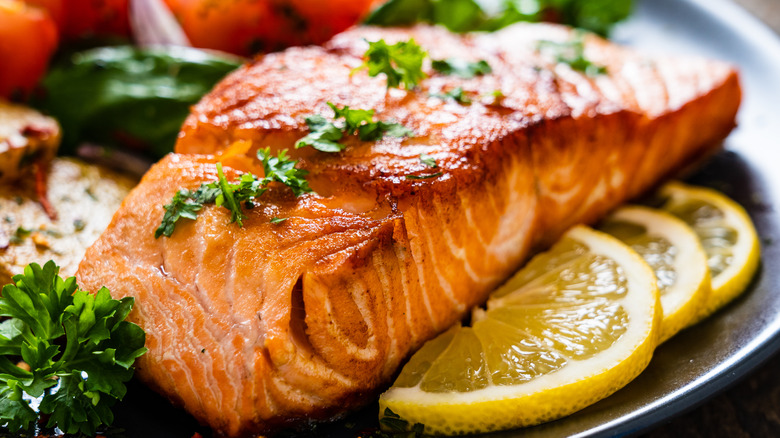The Unexpected Supplement That Can Increase Your Muscle Strength
Nutrition plays a major role in your athletic abilities, and you don't have to geek out on counting your calories to understand just how influential they really are. The effects of indulging in too many sugars and simple carbs before you work out are enough to make you regret having that extra slice of cake or pizza. While most people tend to focus on protein and complex carbs when they're getting fit, there's another macronutrient that should be taken into consideration: fat. According to a 2022 study published in the Journal of Exercise and Nutrition, supplementing your efforts with omega-3 can help improve muscular performance.
The study took place at Baylor University. Over a period of 8 weeks, student-athletes were given either a fish oil supplement or a placebo. By the end of the study, both groups experienced a change in body composition. Those who took fish oil improved their handgrip strength by 9%, while the group who took the placebo didn't have any improvement in muscle strength. In addition, the fish oil group increased their omega-3 index by 73%, EPA by 332%, and DHA by 64%.
As WebMD explains, EPA (eicosapentaenoic acid) and DHA (docosahexaenoic acid) are the makeup of long-chain omega-3 fatty acids and can be found in fish and shellfish. Some algae contain both, but most only contain DHA. Short-chain omega-3 fatty acids are called ALA (alpha-linolenic acid) and are found in plants and flaxseed. Though still beneficial, EPA and DHA are much more potent than ALA.
How to get enough omega-3
The American Heart Association (AHA) recommends eating 2 servings of fatty fish twice a week and constitutes a serving as 3 ounces. According to the Cleveland Clinic, people with heart disease or high levels of triglyceride may recommend a different amount.
In addition to aiding in muscle strength, Healthline says omega-3 fatty acids are also beneficial for fighting depression and anxiety. They can also improve brain and eye health, fight inflammation, promote healthy bones and joints, prevent cancer, reduce your risk of heart disease, alleviate menstrual pain, and support supple skin among other benefits.
MedicalNewsToday places mackerel and salmon at the top of their list of best sources of omega-3. Both also contain ample amounts of B vitamins and selenium. Sea bass, oysters, sardines, shrimp, and trout are also recommended. For those who prefer plant-based options, seaweed, algae, chia seeds, hemp seeds, flaxseeds, walnuts, edamame, kidney beans, and soybean oil are recommended.


